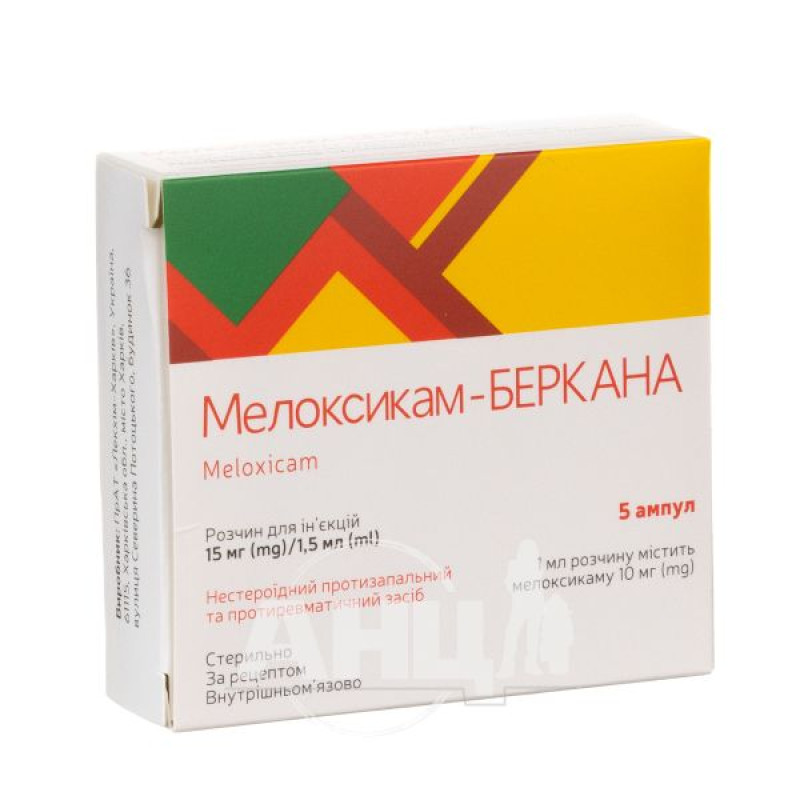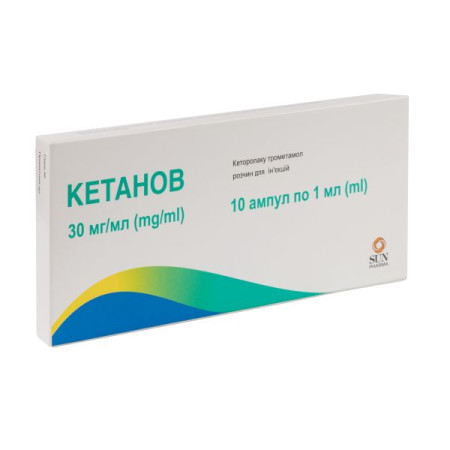Meloxicam solution for injection 15 mg/ml ampoule 1.5 ml No. 5

Meloxicam-Berkana injection solution is used for short-term symptomatic treatment of acute attacks of rheumatoid arthritis and ankylosing spondylitis when other routes of administration cannot be used.
Composition
The active substance is meloxicam (1 ml of solution contains 10 mg of meloxicam).
Excipients: meglumine, glycine, poloxamer 188, glycofurol, sodium chloride, sodium hydroxide, water for injections.
Contraindication
III trimester of pregnancy; patient's age up to 18 years; hypersensitivity to the active substance or to other components of the drug; hypersensitivity to active substances with a similar effect, such as NSAIDs, acetylsalicylic acid (meloxicam should not be prescribed to patients who have experienced symptoms of asthma, nasal polyps, angioedema or urticaria after taking acetylsalicylic acid or other non-steroidal anti-inflammatory drugs); gastrointestinal bleeding or perforation associated with previous NSAID therapy in history; gastrointestinal bleeding, cerebrovascular bleeding in history or other blood clotting disorders; active or recurrent ulcer / bleeding in history (two or more separate confirmed cases of ulcer or bleeding); severe hepatic failure; severe renal failure without dialysis; Hemostasis disorders or concomitant use of anticoagulants (contraindications related to the route of administration); severe heart failure; treatment of perioperative pain in coronary artery bypass grafting (CABG).Method of application
Intramuscular use. One injection of 15 mg once daily. Do not exceed 15 mg/day.
Treatment should be limited to a single injection at the start of therapy with a maximum duration of up to 2-3 days in justified exceptional cases (e.g. when other routes of administration are not possible). Adverse reactions can be minimized by using the lowest effective dose for the shortest duration of treatment necessary to control symptoms.
The patient's need for symptomatic relief and response to treatment should be assessed periodically.
Method of use
The drug should be administered slowly, by deep injection into the upper outer quadrant of the buttock, observing strict aseptic technique. In case of repeated use, it is recommended to alternate the injection site (left and right buttock). Before injection, it is important to check that the needle tip is not in a vessel.
The injection should be stopped immediately if severe pain occurs during the injection.
In the case of a hip replacement, the injection should be given in the other buttock.
To continue treatment, oral forms of the drug (tablets) should be used.
Application features
Pregnant women
During the first and second trimesters of pregnancy, meloxicam should not be used unless absolutely necessary, and meloxicam is contraindicated during the third trimester of pregnancy.
Although there is no specific data on the drug "Meloxicam-Berkana", it is known that NSAIDs can pass into breast milk. Therefore, its use is not recommended for women who are breastfeeding.
Meloxicam, like other drugs that inhibit cyclooxygenase/prostaglandin synthesis, may have an adverse effect on reproductive function and is not recommended in women attempting to conceive. Therefore, in women planning pregnancy or undergoing investigation of infertility, discontinuation of meloxicam should be considered.
Children
The drug is contraindicated in children under 18 years of age.
Drivers
There are no specific studies on the effects of the drug on the ability to drive or use machines. However, based on the pharmacodynamic profile and the adverse reactions observed, meloxicam is likely to have no or negligible influence on these activities. However, patients who experience visual disturbances, including blurred vision, dizziness, drowsiness, vertigo or other central nervous system disorders, are advised to refrain from driving or operating machinery.
Overdose
Symptoms
Symptoms of acute NSAID overdose are usually limited to lethargy, drowsiness, nausea, vomiting and epigastric pain, which are generally reversible with supportive therapy. Gastrointestinal bleeding is possible. Severe poisoning can lead to hypertension, acute renal failure, liver dysfunction, respiratory depression, coma, convulsions, cardiovascular failure and cardiac arrest. Anaphylactoid reactions have been reported with therapeutic use of NSAIDs, which can also occur with overdose.
Therapy
In case of NSAID overdose, symptomatic and supportive measures are recommended. Studies have shown accelerated elimination of meloxicam with 4 oral doses of cholestyramine 3 times daily.
Side effects
Most of the side effects observed are of gastrointestinal origin. Ulceration, perforation or gastrointestinal bleeding is possible, sometimes fatal, especially in elderly patients. After use, nausea, vomiting, diarrhea, flatulence, constipation, dyspepsia, abdominal pain, melena, haematemesis, ulcerative stomatitis, exacerbation of colitis were observed. Gastritis was observed less frequently.
Storage conditions
Shelf life - 3 years.
There are no reviews for this product.
There are no reviews for this product, be the first to leave your review.
No questions about this product, be the first and ask your question.













